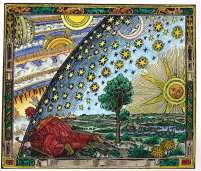Morphic resonance is one of the most
fascinating and intriguing scientific theories I’ve ever heard. It is also one of a very small number of theories which
fit under the banner of parapsychology that have been developed by a scientist from one of the mainstream disciplines, in
this case biology, as a response to the problems and necessities of mainstream science rather than as an exploration of parapsychology
itself.
First published in 1981 by the biologist
Rupert Sheldrake in his book ‘A New Science of Life ’, the ides of morphic resonance initially concerned itself with the problem of form in morphogenesis. To summarise
this in as few words as possible:
’, the ides of morphic resonance initially concerned itself with the problem of form in morphogenesis. To summarise
this in as few words as possible:
Morphogenesis is the development or
‘coming-into-being’ of the characteristic form specific to each species of living organism. In other words it
is the study of how a seed or egg becomes and plant or animal. If you look at this from the perspective of the purely reductionist
science of conventional biology it is difficult at best to explain how individual chemical reactions, devoid of any organising
intelligence able to assess the state of the whole system, are able to regulate their behaviour to produce the desired final
form of the organism even when the normal development is interrupted or interfered with. For example, a sea-urchin embryo
at the two cell stage which has one of its cells destroyed does not develop into half a sea-urchin, but a complete, half-sized
sea-urchin.
Sheldrake’s conclusion was that
there must be a previously unknown ‘morphogenetic field’ regulating this development. According to his theory
the development of any particular form is regulated by all past forms, with the
strength of this influence being dependent on similarity and operating through a kind of resonance.
It soon became apparent that if this
were true its significance would go well beyond the esoteric problems of biology which inspired it, to the development of
inorganic forms, human psychology, and fundamental physics. Although the theory of morphic resonance has been largely ignored
by the scientific establishment, and therefore has not attracted the funding that would be needed to provide definitive proof,
early explorative experiments did show strong supportive evidence. Here is an example of an experiment whose results are of
particular interest to students of parapsychology, as it is concerned with the possibility of remote influence on the human
mind.
The idea of this experiment, devised
by Dr Richard Gentle, is that if something has been learned by many people in the past, then morphic fields, should they exist,
would make it easier to learn in the future than something entirely new. To test this hypothesis children in Britain and the
United States, with no knowledge of the Japanese language, were given 3 Japanese rhymes to learn. One way a traditional nursery
rhyme and the other two were new poems written by Shuntaro Tankawa to follow the same rhythm and tune and use similar length
words. All three were learned in the same way by the children, through repetitive chanting. The results published in Brain
/ Mind Bulletin in September 1983 show that 62% of the children found the genuine nursery rhyme the easiest to learn. This
is considered to be a highly statistically significant result.
Although this is not adequate to say
for certain that the theory is correct, it is a fascinating result with profound implications for the possible science of
remote influence through so called ‘psi’. It suggests that such remote influence is not only possible in certain
conditions, but that it is actually taking place all the time! It would mean, for example, that the prayers of a religious
recluse could make society more virtuous, and on the other end of the scale, madness could be contagious.

